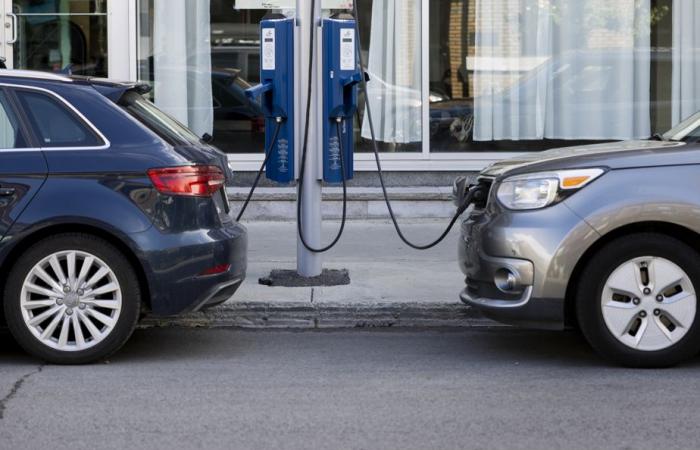(Toronto) A new survey reveals that fewer motorists intend to purchase an electric vehicle with their next car purchase.
Published yesterday at 1:50 p.m.
Ritika Dubey
The Canadian Press
EY’s Mobility Consumer Index report shows that survey respondents’ overall intentions to purchase a new vehicle increased by 6% compared to last year. But fewer of them are turning to purchasing an electric vehicle.
Intentions to purchase a fully electric, plug-in hybrid or hybrid vehicle in the next two years fell slightly to 50% this year, compared to 52% in 2023, according to the report released Wednesday.
This breaks with the upward trend of recent years. In 2021, approximately 35% of all potential vehicle buyers in Canada were interested in an electric or hybrid vehicle, this figure increased to 46% in 2022.
“The flattening of the curve is something new that we’re seeing,” says Jennifer Rogers, automotive and transportation sector leader at EY Canada, in an interview.
When it comes to fully electric vehicles, purchasing intentions have fallen to 15% this year, compared to 18% last year.
The main concerns of survey respondents are limited range, price of electric vehicles, costly battery replacement and lack of charging infrastructure.
“The lack of charging infrastructure and range anxiety kind of go hand in hand,” says Mme Rogers, adding that people are particularly concerned about charging their vehicles outside their home.
She says improving public charging infrastructure can reduce range anxiety among electric vehicle drivers.
“It will be very difficult to convince consumers to take this next step without them being reassured about the possibility of charging outside their home,” thinks Mme Rogers.
She believes that consumer concerns must be taken into account if Canada is to achieve its goal of having 100% of new light vehicles sold be zero-emission by 2035.
In December 2023, the federal government finalized plans to phase out sales of new gasoline-powered cars in favor of zero-emission vehicles. This will be done in stages: 20% in 2026, 60% by 2030 and 100% by 2035.
Mme Rogers says the decline in demand for electric vehicles “makes it clear that there will be a lot of pressure to meet these goals.”
The price of electric vehicles, combined with economic headwinds, such as inflation and high interest rates, may also dissuade many car buyers from considering purchasing electric vehicles.
According to the Canadian Black Book, the average cost of an electric vehicle was around $73,000 in 2023.
Meanwhile, some automakers have delayed or suspended production of electric vehicles due to falling demand. Ford, for example, pushed back its plans to manufacture electric vehicles at its Oakville, Ontario plant by two years.
Government rebates have played a significant role for people considering purchasing electric vehicles, with 28 per cent of Canadians saying incentives are a primary consideration when purchasing, according to the report.
However, incentives are not enough to stimulate demand for electric vehicles as there are fewer affordable options, says Ms.me Rogers.
“Even if incentives are available, they alone are probably not enough to change consumer behavior,” she says.
For those considering purchasing an electric vehicle, the high cost of gasoline was the top concern, followed by environmental considerations and financial incentives, according to the report.
Mme Rogers believes it’s easy to attract early adopters to the electric vehicle market, but it could take time to attract a larger cohort.
“The next group of people who need to switch from combustion engines to electric vehicles will be a little more difficult to convince,” she maintains. They may be more price sensitive and may not have as easy access to home charging. »






